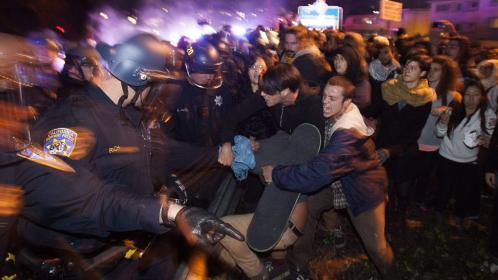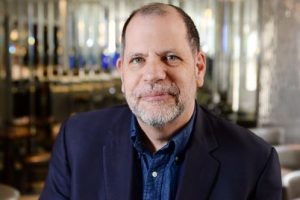
Eat, think, light a fire under the complacent
Risk aversion is the biggest threat to the West. The foodie and economist Tyler Cowen tells Bryan Appleyard we must dare to be different and live more dangerously
To understand fully what follows — and that includes the end of your world as you know it — you need to lay out some hard cash. Go to the Mango Tree restaurant at Harrods. Order gaeng phed ped yang pon la mai — duck curry with pineapple. This will cost £28, but, on the upside, it will give a flicker of insight into the mind of Tyler Cowen.
Cowen has the dish every time he is in London. This matters because he knows a lot about food. His book An Economist Gets Lunch: New Rules for Everyday Foodies lays out the basics, and his Ethnic Dining Guide is more or less de rigueur for anybody who aspires to be anybody in Washington.
He approaches food as he does economics. His themes are the beneficial role of markets and how they bring us choice, the need to take risks (he recommends you always order the most ugly-sounding thing on the menu), a pro-state libertarianism and his role as a public intellectual.
His latest book — The Complacent Class: The Self-Defeating Quest for the American Dream (St Martin’s Press in America) — is about the fatuous blindness of western elites to social and political forces that will in the next 20 years blow them and their self-regard and denial out of the water.
Britain, in particular, is showing alarming signs of this fatal complacency. “Both of our societies are ageing, and people thinking Brexit simply couldn’t happen is one example of complacency, as is not seeing any urgency in the economic problems of other parts of the country.”
Japan, he says, was the “pathbreaker”, the first society to sink fully into the Age of Complacency, but now all the liberal democracies are there. What happened?
Many seminal events of the civil rights movement could not happen today
Cowen and I are sitting on two giant velvet armchairs in the lobby of the May Fair Hotel, in central London. Around us are complacent chattering members of the deluded elite. Cowen, definer of their downfall, fixes me with his gaze.
His speech is clipped and his looks — balding with grizzled beard — and manner of burly intensity remind me of the actor Paul Giamatti.
Born into an Irish-American family in New Jersey, he lives in Virginia, where he is professor of economics at George Mason University. He is married to Natasha, a lawyer and “Soviet Jewish refugee from Moscow”. He adds, with a glow of uncharacteristic pride, that his one child, his stepdaughter Yana, has just got married.
He is mesmerically focused, a symptom, someone once suggested, of autism. Intrigued by the idea, he wrote a book about it — The Age of the Infovore — but he has never been diagnosed.
Is he autistic? “It depends how you define the term. I’m not deficient in communication. My whole life has been as a paid communicator. If you mean people who can absorb and manipulate information very rapidly, then I am — also spotting patterns and being intensely focused.”
The descent into complacency is most vivid in America because it is a young country that was restless, vital, mobile, ever more wealthy until, in 1965, it all began to go wrong. Innovation and productivity slowed, fewer companies were formed, living standards barely rose and, shockingly,“the median male wage was higher in 1969 than it is now”. That fact alone, he says, would have stunned two great economists of the left and right — Paul Samuelson and Milton Friedman — who thought their own period of rapid growth would simply go on for ever. As did Cowen.
“In the Nineties, many people, including myself, believed things would just get better and almost everyone would share in those gains. We talked of Russia joining the EU and we asked when China would become a democracy. Nobody asks that any more. It would be laughable.”
Sadly, Americans even abandoned the open road. Mobility plummeted. In the 1980s a fifth of American households moved every year. Then they stopped. Interstate migration has now fallen 51% below its 1948-71 average. Americans are, in Cowen’s words, “digging in”, defending what they have instead of striving for more and better.
This is not simply an economic change. “It’s a mentality shift: people don’t want to move. Now you travel early in your life. You use the internet to figure out where you want to live and you stay there.”
On top of that, people are staying in jobs much longer. The “gig” economy and the “portfolio” career do not dominate. Risk-averse companies and employees stay exactly where they are.
We can’t even find hope in the young. One economist he quotes said: “Millennials are on track to be the least entrepreneurial generation in recent history.” Cowen agrees, but he doesn’t think it’s their fault.
“They’ve higher debt, high tuition fees and a slower job market. I think as a generation they’re probably the nicest, most tolerant we have ever seen. But in terms of ambition we have not given them the objective conditions in which they can thrive.”
Much of this thinking has promoted outrage, especially in certain Silicon Valley types who think we are living in an age of explosive growth and quasi-magical innovation. But Cowen says the internet as a driver of new growth has yet to arrive.
Giving people more information, more rapidly, he argues, is “of some value but not as much as it seems”. He adds: “I think the real value will come if we can take that information and use it to transform the physical world.”

‘In a funny way, I’m a cultural optimist’ — Tyler Cowen
He is a great enthusiast for the physical world but points out that more than 80% of the value of the Standard & Poor’s 500 index of America’s largest companies is accounted for by intangible assets. Are we living in a world imagined by an accountant?
“A lot of it is just reputation and brand names. What is Facebook but a brand name? Some servers, a lot of talent and the fact that it’s Facebook.”
His affection for the physical world draws attention to the elephant in every living room — Donald Trump.
“It’s very striking that, when Trump talks about infrastructure, the first words out of his mouth are usually ‘repair roads, bridges and tunnels’, which I am all for. But it’s a backward-looking vision. It’s not some smart creative biotech thing or online education.”
Unlike almost everybody else, he does not regard Trump as a revolutionary figure; rather as just another emanation from the complacent elites. “I think he represents stasis. He’s not actually getting anything done, and nobody’s upset about that. Both his opponents and supporters are fine with that.”
The big point he makes about American politics is again about stasis or, rather, paralysis. Nothing much can actually happen. Welfare programmes, such as social security, Medicare and Medicaid, are locked in and are likely to grow rapidly. They already account for 49% of the budget. This reduces politics to squabbles about scraps.
“Party politics is a farce. People argue about things of symbolic value like transgender bathrooms or the outrageous things that Trump tweets. In terms of what actually happens, nothing is going to change that much.”
This promises, in what is likely to be a very rapidly changing future, even more complacent paralysis.
Perhaps most depressing of all is that racial segregation is on the rise. This is not because of racism as such but simply because of the way neighbourhoods are becoming monocultural, class-defined enclaves.
In the book he seems almost nostalgic for the riots — racial and other — that marked the 1960s and 1970s. Will they return as a necessary adjunct of the explosion that will detonate our complacencies?
“I would say ‘likely’. ‘Necessary’ makes me a bit nervous. We are seeing some of that come back in the protests against Trump.”
But, he notes, civil disobedience is much harder now. “Many of the seminal events of the civil rights movement could not happen today, most of all because society is more bureaucratised, more safety-obsessed and also less tolerant of any kind of disturbance or disruption at all . . . Bureaucracy, whatever its other goals may be, is very much on the side of the complacent class.”
He sees the danger of such divisions as being amplified by the internet-enabled phenomenon of matching. This can mean the way Netflix strives to find exactly the right film for you or Spotify the right music. Then there are dating sites catering for every inclination, however bizarre. Novelty, discovery and serendipity are suppressed in favour of bland, safe familiarity. We all end up fully matched in boring but comfortable silos filled with people and things we already know.
His thesis as a whole takes some startling turns. It is typical of the complacent class, he notes, that of all the illegal drugs on offer they should embrace marijuana, the one that makes you passive and sleepy. At one point he observes: “A lot of men have tendencies toward the brutish.”
How does that fit in to his complacency argument?
“I think it’s biologically true. If you look at crime or mental illness, I think it’s disproportionately concentrated among males . . . One way or another, societies come up with ways of dealing with that problem. If you think of the Fifties and Sixties, they used the military draft and manufacturing jobs in a much less feminised society. That too had its downside.”
He also regards complacent-class parents as having gone “insane” in their fear of their children encountering the slightest degree of risk. This overprotection is another driver of segregation. And, like any fully conscious being, he despises the universities for sliding into censorship and oppression in the name of providing “safe spaces” for students. “It is a weakening of their ability to have true dissent. It is counterproductive.”
Then there’s the clothes of complacency. Here there is the phenomenon of “countersignalling” — “when you go out of your way to show you don’t need to go out of your way”. The boss doesn’t wear a suit and tie because, if he did, “that would suggest he had something to prove, which would be a negative rather than a positive impression”. In the West, wearing a suit is now a sign of low status; in much more vibrant China formal clothing is essential to display authority.
“I see you’re wearing a suit,” I remark.
“No, it’s just suit pants and a jacket.”
Never mind — all this complacent frippery is going to end in 20 years or thereabouts. Cowen doesn’t know exactly how but he is convinced the complacent class has been crumbling since the financial crash. Afterwards, the greed, corruption and cynicism of the financial system exposed the underlying political and economic paralysis that had created societies in which children no longer expected to do better than their parents.
The future may, for a time, be very ugly. Cowen sees his role as preparing us for this.
“In a funny way, I’m a cultural optimist. I’m not an optimist compared with the people who see no problem, but I’m trying to build a bigger framework in which these massive bumps coming along actually turn out to be OK.”
There are still the old consolations. Such as food. If you don’t fancy Harrods, he also recommends the Mayfair Indian restaurant Gymkhana, where you can get a fancy three-course lunch and an exhibition ticket for the Royal Academy for a surprisingly reasonable £40. Very consoling.
“Food has displaced music as culturally central,” he muses. “I find that troubling, much as I love food.”
“Swings and roundabouts,” I say.






